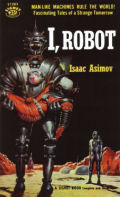 In my youth, I read a lot of science and a lot of science fiction as well. There are some great science fiction writers, authors who use the genre to weave a solid story with a thoughtful message in the background. And there are many others who just hack out pulp fiction, moved from the old west or the bounding main into an imagined future. A lot of science fiction authors play on the impersonality of technological advances – human essence lost in the wake of a mechanized future ruled by technocracy. And many actual science writers have the same worries, ie Informatics [Scot Silverstein MD] on Healthcare Renewal who writes about the dangers of Electronic Medical Records [EMR]. Science has caught up with science fiction. Now, with our iPhones, GPS devices, Internet connected PCs, automated telephone systems, ubiquitous databases, etc, we’ve arrived in a world where science and science fiction have run into each other. Bots travel the Internet messing with my comments section and lord only knows what the unseen activities of the NSA and its genuinely unseen counterparts are up to. Even our police dramas rely on CCTV cameras and DNA tests to find the bad guys:
In my youth, I read a lot of science and a lot of science fiction as well. There are some great science fiction writers, authors who use the genre to weave a solid story with a thoughtful message in the background. And there are many others who just hack out pulp fiction, moved from the old west or the bounding main into an imagined future. A lot of science fiction authors play on the impersonality of technological advances – human essence lost in the wake of a mechanized future ruled by technocracy. And many actual science writers have the same worries, ie Informatics [Scot Silverstein MD] on Healthcare Renewal who writes about the dangers of Electronic Medical Records [EMR]. Science has caught up with science fiction. Now, with our iPhones, GPS devices, Internet connected PCs, automated telephone systems, ubiquitous databases, etc, we’ve arrived in a world where science and science fiction have run into each other. Bots travel the Internet messing with my comments section and lord only knows what the unseen activities of the NSA and its genuinely unseen counterparts are up to. Even our police dramas rely on CCTV cameras and DNA tests to find the bad guys:
In the original illustrative example, a human judge engages in natural language conversations with a human and a machine designed to generate performance indistinguishable from that of a human being. All participants are separated from one another. If the judge cannot reliably tell the machine from the human, the machine is said to have passed the test.
I obviously balk in general at the introduction of metrics or machines into psychiatry, and it’s not because of an aversion to computers and technology. I’m as big a techno·computer·geek as you’ll ever find among the ranks of the touchy·feely – a term brought to us by our APA President Jeffrey Lieberman [over a cliff…]. My objections have to do with something else – my basic understanding of mental illness. I grew up in the world of Darwin, Freud, Bowlby, Sullivan, Winnicott, etc. and I buy that humans are indeed animals, herd animals at that. And I believe that much of what matters about human psychology and mental illness is interpersonal in nature. Even before I’d even heard of those authors, I realized that a lot of what I learned about patients on the medical wards came from how they interacted with me. It’s why I started reading those books in the first place, and never stopped. And I think of empathy as a real thing and an important source of information.
I’m aware of the criticisms of psychoanalysis and other interpersonal theories and agree with more of those criticisms than you might imagine, but nothing has ever shaken my conviction about the things I said in the last paragraph. Even in situations where I agree with a biological causation like Schizophrenia, or Melancholy, or Mania, I still see the internal experience of the interviewer as an important diagnostic tool. And my balk extends to treating patients with medications based solely on symptom listings just as I would balk at treating medical patients in that way. I was taught and believe that treating symptoms prior to an investigation of cause is verboten, and have never found a reason to change my mind about that.
I’m saying it this way because I accuse myself of being indirect in my last two posts. If someone shows up depressed, I feel an obligation to explore why. There are certainly situations where you can’t answer the why question, but most of the time, you can get in the ballpark. And it’s a pretty important ballpark to play in. Long ago, Bibring suggested that depression is a biological signal of helplessness, and that has certainly played out to be true in my time in grade. If someone shows up signalling helplessness, I feel that it’s important to figure out the underpinnings of that feeling if I can. Even the absence of a reason is important information. Maybe I can help. Maybe all I can do is provide a place where the patient can say what’s gotten to them. Maybe we might decide to try some medication. Maybe not. But the maybes follow and are informed by the exploration.
 I think a psychometrist might say that a waiting room screening instrument is aimed in that very direction – to alert me to do the exploration. Two objections: First, I see many patients who have been put on medications because of the screening without any exploration. But second, I think it’s pretty important to a depressed person for another human being to receive their communication directly rather than read it from a computer screen. So here I go with that touchy·feely stuff again. The process of reaching a diagnosis is an important meeting of two people – whether it’s a medical or a psychiatric problem that’s at issue. People who come to a doctor for help have put a lot of thought into coming. It’s important to honor the visit by taking the complaint seriously and being thorough.
I think a psychometrist might say that a waiting room screening instrument is aimed in that very direction – to alert me to do the exploration. Two objections: First, I see many patients who have been put on medications because of the screening without any exploration. But second, I think it’s pretty important to a depressed person for another human being to receive their communication directly rather than read it from a computer screen. So here I go with that touchy·feely stuff again. The process of reaching a diagnosis is an important meeting of two people – whether it’s a medical or a psychiatric problem that’s at issue. People who come to a doctor for help have put a lot of thought into coming. It’s important to honor the visit by taking the complaint seriously and being thorough.
I’ve read a free article recently on how autism became autism
http://hhs.sagepub.com/content/26/3/3
It covers the establishment and evolution of child psychology and child psychiatry in Britain from 1913 through the ’60s. It starts with Bleuler coining the term for a schizophrenic state of mind, then somehow by the convolutions of Freud and the minds of other psychiatrists and psychologists, the infant’s mind becomes “schizophrenic,” before the birth of a movement that didn’t presume to know what and how infants thought and developed testing methods for an epidemiological approach.
Reading the following statement was a real hard head/desk experience for me:
…Isaacs claimed that if the child was feeling ‘desires towards his mother’, he would experience these as ‘I want to suck the nipple, to stroke her face, to eat her up, to keep her inside me, to bite the breast, to tear her to bits, to drown and burn her, to throw her out of me’.
Dear God, they were projecting the misogyny of a Victorian man’s mind into their “understanding” of the infant mind! After studying some of the people covered in the paper, I found out what other things these pioneers thought and did and there were some great contributions. Susan Isaacs invented day care, for instance, and she was absolutely right about play being an important process for learning.
Freud had some profound insights and was pioneering, but it seems that most of his ideas were crap and proved themselves to be so during his lifetime. It seems to me that Lieberman and Gibbons, et. al, are being given the same overzealous reverence. And that reverence is about THE GREAT MAN. As far as I can tell, being THE KOL is all about the politics of having more influence than any one person should really have. There is also a trail of stupid disciples decades long behind great men full, and many of those disciples appear not to have read the original texts of their gurus.
Bowlby’s theory of attachment actually has scientific validation. Attachment is a neurological process of bonding and infants who don’t bond are in a hellish world that they share with everyone around them. Before considering any other possibilities with an infant or child, psychiatrists and other clinicians should try to find out if a child has attachment deficits, can trust, can be trusted, etc.— that requires testing the primary caregiver. Just taking a parent or parent’s word for what the problems are with a child should be considered malpractice.
Creating a system as cynical as the one that Lieberman and Gibbons is working on is contrary to the mental, emotional, and bodily* health of a what is probably far more people than there are who actually need drugs, and many of them don’t need drugs all the time for the rest of their lives. They are writing a program (software) for iatrogenic harm in the field of psychiatry.
* Not to go all Descartes-ian on it, but I do think that it is necessary to make a clinical distinction between how a drug affects a person’s thought processes and moods, for instance, and how a drug affects that person’s liver.
rats. so many typos.
@Mickey THIS is why you are a good doctor: “I was taught and believe that treating symptoms prior to an investigation of cause is verboten, and have never found a reason to change my mind about that.” Awesome post! “The internal experience of the interviewer as an important diagnostic tool” what some interviewers (and others) seem to forget–(if they ever knew it); the internal experience of the patient is and remains important information that it is ALWAYS relevant to an accurate diagnosis and appropriate treatment…This is applicable to ALL psychiatric patients…even if the patient is believed to have a brain disease and/or a “lack of insight.” I am utterly disgusted with the way my son hs been maligned and mistreated by so-called professionals whose belief in the bio-disease model seems to justify acting as if their belief means there is no need for them to earn his trust, validate his experience, or treat him as if anything he says is worthy of consideration.
@wiley Thanks for sharing that link and for your astute observations…
I hope you can find better clinicians to work for your son or get through to one or more that ya’ll are working with.
@wiley your hope has been my prayer for a long time…